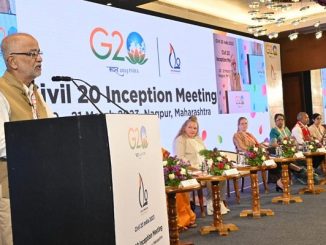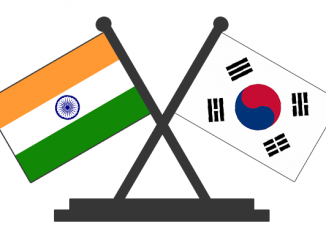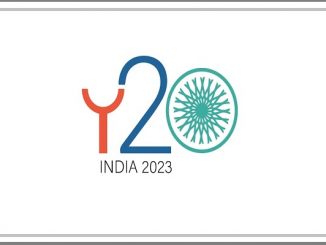
Jun 17: The Women 20 Summit taking place in Mahabalipuram, Tamil Nadu saw an assertive start to its second day on 16th June beginning with an intriguing session on ‘Call to Action– Breaking the Glass Ceiling’. This was followed by plenaries on ‘Economic Empowerment through Trade and Investment’, and ‘Investing in Services and Infrastructure for an Enabling Care Economy’. The summit ended with a session on ‘Celebrating the Power of Women Empowerment’.
The first session of the day on the theme ‘Call to Action– Breaking the Glass Ceiling’ was about taking quantifiable steps toward breaking the metaphorical glass ceiling for women in leadership and management roles. The session was moderated by Prof. Dr Neeta Inamdar, Jean Monnet Chair, Head-Manipal Centre for European Studies, MAHE, India. The panellists for this session were Bharati Ghosh, Former Indian Police Official, Award-winning UN official and National Spokesperson BJP, K. Ratnaprabha, Founder President, of Ubuntu Consortium -A platform for Women Entrepreneurs Associations, Retired IAS and Former Chief Secretary of Karnataka, Sanjam Sahi Gupta, Director, Sitara Shipping, Founder, MaritimeSheEO, Top 100 Women in Shipping by All About Shipping UK, Executive Board member -World Maritime University, Dr. Nursem Keskin Aksay, Asst Prof, Ibn Haldun University, Department of Sociology, Executive Board Member, KADEM, W20 Head of Delegation, Turkey, and Adriana Caravalho, CEO of Generation Brazil & Co-Head of W20 Brazil.
The keynote speaker of the session, Smt. Vanathi Srinivasan, MLA and National President of the Women’s Wing of the Bharatiya Janata Party elaborated on her experience in empowering women through policymaking and political representation. She highlighted the link between house ownership and domestic violence and how ownership in the name of women has led to a reduction in domestic violence. She shared about government initiatives such as SHGs, PM Mudra Scheme and GeM portal which allow women access to market and finance. K Ratnaprabha shared her struggles as the Industry Secretary and Chief Secretary of Karnataka. She stressed the importance of uplifting women to leadership roles. Bharati Ghosh shared her journey of breaking the glass ceilings which is marked by emotions, passion, compassion and an unyielding determination.
The second session on “Economic Empowerment through Trade and Investment” highlighted how trade and investment play an important role in women’s empowerment and the importance of gender-sensitive trade policies. The session also explained the role of investment in promoting women’s entrepreneurship. Ms Jahnabi Phookan, Director, JTI Group, Assam, India, moderated the session. The panellists for the session were Dr Shamika Ravi, Member of the Economic Advisory Council of the Prime Minister of India & Lead -W20 2023 Communique Drafting Committee, Anoush Der Boghossian, Head of the WTO Trade and Gender Office, WTO, Bansuri Swaraj, Advocate Supreme Court of India & W20 India Delegate, Dr Stephanie Oestreich, Board Member of the Harvard Kennedy School Women’s Network and Chief Business Officer for Galecto, and Dr Marina K Glazatova, Advisor to the Scientific Director of the National Research University Higher School of Economics (HSE) and Deputy Director of the HSE Institute of Trade Policy in Russia. Dr Ravi pointed out that empowering women financially and economically not only impacts women but the whole household as the dropout rates decrease, physical and mental health improves, and the nutritional components increase. Ms Boghossian stressed the importance of interministerial collaboration for empowering women. Ms Swaraj elaborated on the initiatives undertaken by the government of India to promote women’s economic empowerment.
The third session on the theme ‘Investing in Services and Infrastructure for an Enabling Care Economy’ focused on how most of the burden for care work falls on the shoulders of women and girls, and how care work is essential for the functioning of the economies. The session was moderated by Ms. Kelsey Harris, Interim Deputy Director of Policy and Advocacy, International Center for Research on Women (ICRW) who aptly pointed out the need for better infrastructure and increased funding for establishing a professionalised and formalised care services sector. The panellists for the session were Aditi Das Rout, Additional Secretary, Ministry of Women & Child Development, Government of India, Aya Matsuura, Gender Specialist, ILO Decent Work Technical Support Team, South Asia, Esther Achumi Dennis, Former Service & Support Administrator, Summit County Board of Developmental Disabilities, Department of Developmental Disabilities, Ohio, USA, Mitali Nikore, Founder & Chief Economist, Nikore Associates, Chiou See Anderson, Australian Women Economic Equality Taskforce within Prime Minister of Australia’s cabinet. Ms Rout shared that India is making a lot of initiatives to invest in care services and care infrastructure through a combination of legislation, infrastructure development and a slew of policies to reduce the drudgery of housework as well as service delivery. Ms Nikore shared a 3 pillar framework which includes leave policy, subsidies for care work, and building the actual infrastructure which would require public-private partnership. Ms Dennis shared the best practices followed by the Ohio administration relating to an investment in homemaker personal care and monetisation of disability care by women.
Disclaimer: We donot claim that the images used as part of the news published are always owned by us. From time to time, we use images sourced as part of news or any related images or representations. Kindly take a look at our image usage policy on how we select the image that are used as part of the news.


